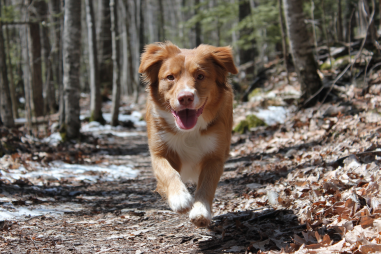Nova Scotia Duck Tolling Retrievers are not only strikingly beautiful with their reddish coats and white markings, but they are also incredibly intelligent and energetic dogs. Known for their playful nature and sharp minds, Tollers thrive when their mental faculties are regularly engaged and challenged. Without sufficient mental stimulation, these smart pups can quickly become bored, leading to unwanted behaviors and restless energy. To keep your Nova Scotia Duck Tolling Retriever happy and well-rounded, it’s essential to provide plenty of enriching activities that challenge their brain as much as their bodies.
Why Mental Stimulation Matters
Mental stimulation is just as important to a Nova Scotia Duck Tolling Retriever’s overall happiness and well-being as physical exercise. These dogs were originally bred for active, intelligent work—luring waterfowl with clever movements and retrieving with sharp focus. Their minds were always engaged with tasks that required problem-solving and attention to detail. When those natural mental demands are unmet, they can become frustrated or anxious, often expressing themselves through hyperactivity, destructive chewing, or excessive barking.
By regularly providing activities that encourage problem-solving, decision-making, and learning, you’re directly contributing to their emotional health. Mental enrichment can reduce stress and provide a positive outlet for their intelligence. Additionally, dogs that are mentally engaged tend to be calmer and more obedient, making life smoother for both the dog and their owners.
Types of Mental Enrichment Activities
There is a wide variety of activities you can introduce to your Toller’s routine to exercise their mind:
- Interactive puzzle toys
- Training sessions with new commands or tricks
- Scent work and nose games
- Hide and seek games
- Problem-solving challenges
- Socialization opportunities with other dogs or people
Each category targets different aspects of cognitive function—from memory and concentration to sensory skills and creative thinking. It’s important to keep activities balanced to maintain your dog’s interest and ensure well-rounded stimulation.
Puzzle Toys and Interactive Games
Puzzle toys have become a popular way to engage a dog’s brain and provide entertainment when you’re not available for active play. These toys often require dogs to manipulate parts, such as sliding compartments or lifting covers, to access hidden treats. Nova Scotia Duck Tolling Retrievers tend to excel at these games as they enjoy figuring things out and being rewarded for their efforts.
Some great puzzle toy options include treat-dispensing balls, interactive feeders, and multi-level puzzle boards. Interactive games where you hide treats around the house or yard and encourage your dog to find them can also be highly stimulating. These not only challenge problem-solving skills but also naturally engage their keen sense of smell.
Rotating different puzzle toys keeps the novelty alive and prevents your dog from becoming bored with the same challenges repeatedly.
Training as Mental Exercise
Training sessions aren’t just for teaching basic obedience; they’re a fantastic way to challenge your Nova Scotia Duck Tolling Retriever’s intellect. Tollers are quick learners who enjoy the challenge of mastering new skills or commands. By regularly introducing new tricks or refining existing ones, you keep their brain active and focused.
Use positive reinforcement techniques to make training fun and rewarding. Be sure to keep sessions short and upbeat to maintain your dog’s interest. Training can also help build your bond and improve communication, making your dog more responsive in daily life.
Beyond basic commands, consider incorporating advanced tricks or dog sports like agility, obedience trials, or rally. These activities demand concentration, timing, and problem-solving, offering excellent mental stimulation.
Incorporating Scent Work and Nose Games
The scenting ability of the Nova Scotia Duck Tolling Retriever is exceptional, thanks to their history as hunting dogs. Nose work and scent games tap into this natural talent, providing both a mental and sensory challenge that can tire the brain even more than physical exercise.
One simple at-home activity involves hiding treats or favorite toys in different rooms or under containers and encouraging your dog to sniff them out. For a more structured approach, you can look into formal scent work training classes or kits designed to introduce dogs to the basics of tracking and scent detection.
Nose games can be adapted indoors or outdoors, making them versatile throughout all seasons. These games require your dog to think critically and follow their nose, which is deeply satisfying and mentally rewarding for them.
Rotating Activities for Variety
Like humans, dogs need variety to stay engaged. Doing the same mental tasks every day can lead to boredom or disinterest. Rotating different types of mental exercises—such as switching between puzzle toys, training, scent games, and interactive play—helps keep your Nova Scotia Duck Tolling Retriever eager and motivated.
Try to introduce new challenges regularly, whether it’s a novel toy or a different game. You can even create themed days or weeks focusing on particular skills or activities to add a little fun structure.
Furthermore, observe how your dog responds to various activities and adjust accordingly. Some Tollers may have particular preferences or excel more in certain types of mental challenges than others.
Observing Signs of Mental Fatigue or Boredom
It’s crucial to pay attention to your dog’s cues so you can balance mental stimulation appropriately. Signs that your Nova Scotia Duck Tolling Retriever may be mentally fatigued include:
- Irritability or frustration during activities
- Loss of interest or refusal to participate
- Excessive yawning or looking away
- Physical signs such as panting or pacing after short mental tasks
On the flip side, boredom can manifest as destructive chewing, incessant barking, restlessness, or digging. If you notice these behaviors, it’s a signal to increase or diversify mental stimulation opportunities.
A well-timed break during mental exercise can help prevent fatigue. Mental stimulation is like a workout for the brain—too little and your dog is understimulated, too much can lead to overwhelm. Observing and adapting based on your dog’s behavior will ensure they get just the right amount.
Balancing Physical and Mental Exercise
While mental exercise is key, Nova Scotia Duck Tolling Retrievers also require plenty of physical activity. They are natural athletes with lots of stamina. A balanced routine that includes both physical and mental exercise will help keep your dog healthy, happy, and well-behaved.
Daily walks, runs, fetch games, or swimming combined with nose games, training sessions, and puzzle toys will provide a comprehensive enrichment plan. When you combine physical fatigue with mental stimulation, you’ll often notice your dog less restless and more content.
Be mindful that some mental exercises can be quite tiring on their own, so gauge your dog’s energy and health when planning a day’s activities. For example, on days with less physical exercise, you might increase mental games to compensate, and vice versa.
By embracing the intelligence and curiosity of your Nova Scotia Duck Tolling Retriever and providing consistent, varied mental challenges alongside physical activity, you create a fulfilling and joyful life for your beloved companion. With regular mental stimulation, your Toller will not only stay sharp but thrive emotionally and behaviorally—making every day a rewarding adventure for both of you.







